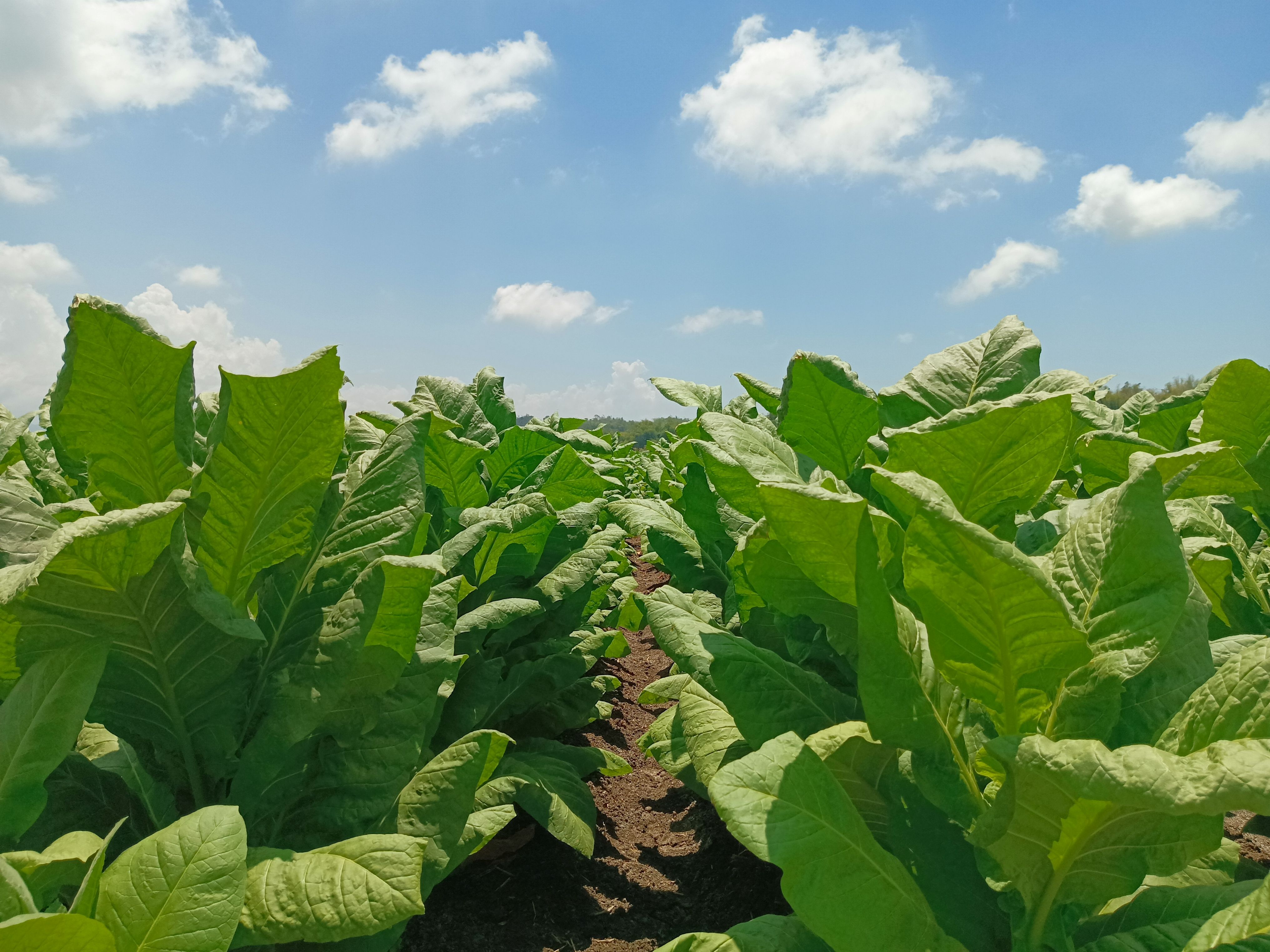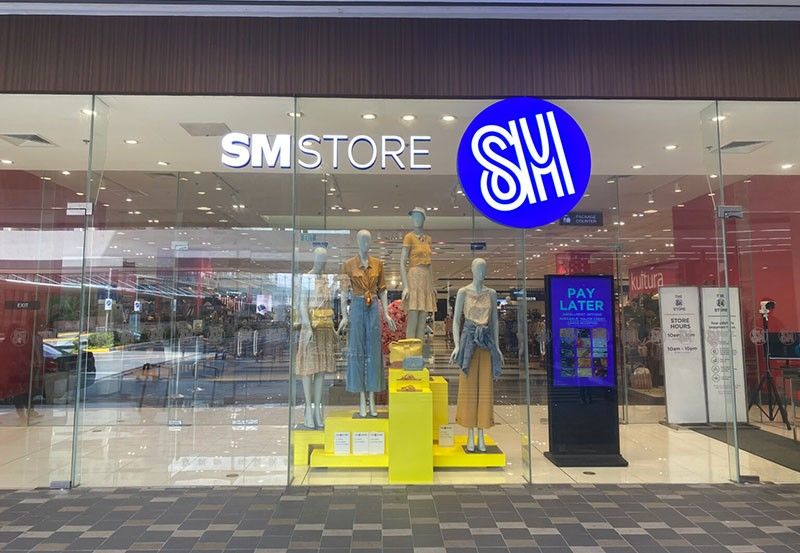
Upgrade to High-Speed Internet for only ₱1499/month!
Enjoy up to 100 Mbps fiber broadband, perfect for browsing, streaming, and gaming.
Visit Suniway.ph to learn
 Tobacco farmer Eddie Garabiles takes a midday rest under the shade of his curing barn.
Tobacco farmer Eddie Garabiles takes a midday rest under the shade of his curing barn.Summer’s heat could peak at 51 degrees Celsius this afternoon, so Eddie Garabiles, 55, took shelter under the shade of the curing barn he made with coconut leaves, its frame held together by bamboo. He could suffer from heat stroke under the raging midday sun if he insisted on tending to his tobacco farm.
As deadly as the sun’s heat can be, Garabiles has no choice but to depend on the weather—it’s all his one-hectare (ha) farm needs. His crops are nearing harvest, with the lush green leaves of his tobacco plants slowly turning a pale yellowish green.
 Harvest-ready tobacco plants just five minutes away from Garabiles’ house.
Harvest-ready tobacco plants just five minutes away from Garabiles’ house.Like many farmers in their late 50s and early 60s, Garabiles religiously tends to his farm. He rises before the sun, making his way to the lush green fields just a 10-minute walk away. He takes a break at midday, then returns once the heat becomes more bearable.
Growing tobacco requires a keen eye; unlike other crops, tobacco cannot simply be left to the gods after transplanting. It demands constant attention.
Some tobacco farmers in the northern Philippine town of Candon, Ilocos Sur, lose their lives while keeping their tobacco fields alive during cropping seasons.
Most of them have no children to inherit their gloves and boots once their bodies begin to wilt with age. And even for those who do, the land is likely to be sold off the following year.
 Moist tobacco leaves undergo flue-curing to meet quality standards before being sold to Universal Leaf Philippines Inc.
Moist tobacco leaves undergo flue-curing to meet quality standards before being sold to Universal Leaf Philippines Inc.Garabiles must have been born under a lucky star as he has two sons—among his four children—who also farm tobacco. Finding a successor for his land won’t be a worry for him.
Yet his town is still plagued with the belief that growing tobacco is a poor man’s work. That is why Candon locals who went to universities funded by their parents’ earnings from tobacco choose to wear white collars instead of sun-worn sweaters, sweat-soaked caps, and muddy slippers.
Perhaps it’s because tobacco farming is seen as futile labor, offering little of the wealth that Ilocanos aspire to have. Garabiles has been a farmer since he was barely 16. “I’ve been working here since I was young,” Garabiles said. The farm is where he grew into a man, where he married, and where he continues to survive, day by day.
Once a year, Garabiles expects to receive a “small amount” of cash from the government, along with a sack of fertilizers and pesticides. But he can’t bring himself to feel relief because these handouts are far too little to cover his expenses.
“It’s still not enough because we have to spend. We have to spend a lot,” he said. As both the owner and a laborer on his farm, Garabiles must also set aside about ₱400 for his neighbors who help him work the land. The ₱5,000 support from the national government barely lasts two weeks for just one laborer.
A typical tobacco season lasts six months, and Garabiles’ farm yields over two metric tons (MT)—roughly the combined weight of 350 kilograms (kg) per harvest across six cycles. He said he also grows rice during the rainy season, but it’s tobacco that brings in the greener income.
As long as the pests are kept at bay and the fields are well-irrigated, Garabiles has little to worry about when it comes to income. Garabiles sells all his produce to Universal Leaf Philippines Inc., the local arm of United States (US)-based Universal Corp. The corporation offers farm-to-market support to Garabiles and other local tobacco farmers.
But a serious threat has been creeping in: the illicit trade of cigarettes smuggled in from other Asian countries.
Grassroot ‘resistance’
“We are fighting against it,” said Saturnino Distor, president of Philippine Tobacco Growers Association (PTGA).
His home sits between rows of tobacco plants standing over three meters tall, spread across the flatlands of San Fabian, Pangasinan—another town in Northern Luzon where tobacco remains a lifeline.
 Philippine Tobacco Growers Association (PTGA) President Saturnino Distor shows his curing barn as he urges the government to appoint a tobacco czar.
Philippine Tobacco Growers Association (PTGA) President Saturnino Distor shows his curing barn as he urges the government to appoint a tobacco czar.Distor is worried that smuggled tobacco products could soon replace their produce.
“We make our own, we know the quality of what we plant—but instead of seeing more buyers like Universal Leaf, these companies are now forced to compete with smuggled products,” he said, hinting at talking about more.
“We rely on these buyers to make a living. Sure, smugglers are still few, but smuggling’s making it harder to sell—and that should be stopped in the first place.”
His voice growing louder, Distor said he’s worried about the growing possibility of smuggled supplies flooding the local market if illicit trade persists. “What will happen to our livelihoods? What will happen to tobacco?”
He was once taken aback upon finding out that his laborers were smoking smuggled cigarettes.
“Whenever we’re out in the field, the tobacco products our workers end up smoking are all smuggled,” he said.
“Can’t the government do anything to stop it?” Distor asked, after which he noted that authorities speak with such confidence and keep assuring them that national security has already enforced stricter cross-border rules. “They say they’re watching our seas.”
But for Distor, the government’s efforts to combat illicit trade are not enough. “The way they control the smuggling, we are not satisfied,” he said.
He also claimed that most of the smuggled cigarettes enter the southernmost island of the Philippines “because there are many backdoors there.”
Chris Humphrey, executive director of European Union (EU)- Association of Southeast Asian Nations (ASEAN) Business Council, said at a press briefing that, indeed, “the Philippines has a particular problem.”
“I’m afraid that, being an archipelago with long shorelines, it’s very, very easy to smuggle goods in. What we need is stronger enforcement on the ground—especially at the point of sale,” Humphrey said.
Tobacco czar
“As farmers, we don’t defend cigarettes. We defend tobacco because it’s the source of our livelihood,” Distor said.


One of the measures he’s pushing for is the appointment of a tobacco czar—a central figure who would oversee regulation and safeguard the industry against threats such as smuggling and unfair competition.
“One pack of theirs is dirt cheap. Just one pack of ours already costs a lot,” Distor said, comparing the price difference between the illegal cigarettes and those that they sell.
“If we can’t deal with that, we’ll be at a loss,” Distor stressed, but argued that the increase in tax would not help either.
“While we’re increasing our tax, our income is deteriorating. Where does that balance go? It goes to illicit trades, to smuggled goods,” he said.
Meanwhile, Humphrey said that “unifying” excise tax rates for cigarettes, vapes, and other alternative tobacco products is “a very welcome move. Simplifying tax regimes makes it easier to enforce them. It makes it harder for the bad guys to exploit them as well.”
But high taxation, Humphrey said, doesn’t always work because it just “incentivizes the illicit traders.” That said, while tax measures need to be implemented, Humphrey said it must be coupled with “better and increased enforcement by the authorities.”
Distor believes the “tobacco czar” role calls for someone firm and fearless. But courage alone won’t cut it—he added that strong ties to national authorities are needed for protection from any retaliation by illicit traders.
However, he revealed that powerful political figures are pulling the strings behind large-scale smuggling—leaving no assurance of protection, even for a tobacco czar. In the end, perhaps, the idea itself might just go up in smoke.

 20 hours ago
5
20 hours ago
5



